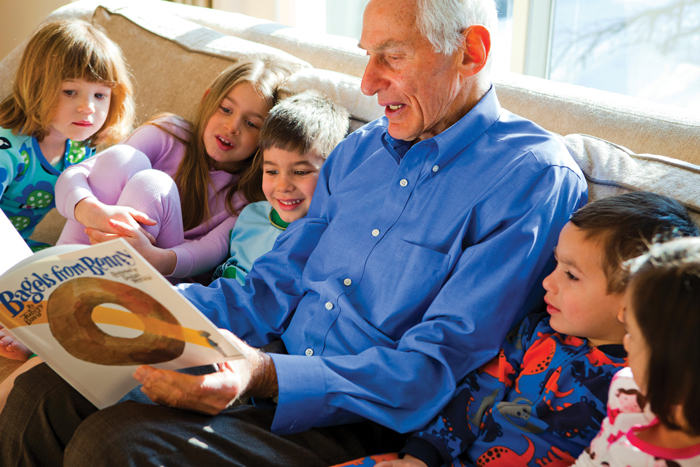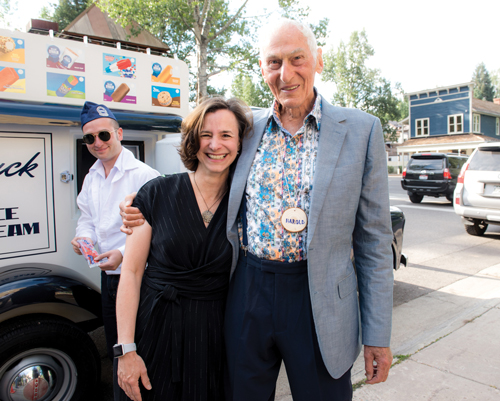Harold Grinspoon’s Gift
Families around the world love PJ Library. Meet the visionary who started it all.
By Emily Benedek
This story appeared in the July 2023 issue of PROOF, a PJ Library magazine.

Harold Grinspoon founded PJ Library to inspire children to love being Jewish.
PHOTO COURTESY OF THE HAROLD GRINSPOON FOUNDATION
“In those days, as a kid, you couldn’t be a lefty. So my mother made me a righty,” recalls Harold Grinspoon, the 94-year-old founder of PJ Library, who was born left-handed. When it came time for Harold to go to school in Auburndale, a village of Newton, Massachusetts, in the 1930s, the attitude was clear: His left-handedness had to be changed.
But it didn’t go well. Harold had trouble reading, writing, spelling, and speaking clearly. “My poor mom. I can’t spell today, and I never could spell. So she took me to spelling lessons, speech lessons, posture lessons,” Harold remembers. (Decades later, psychologists began to realize that changing a child’s dominant hand may lead to learning difficulties, stuttering, and dyslexia.)
And that wasn’t Harold’s only trouble — the kids in his neighborhood didn’t think kindly of him because he was Jewish. Even though his family wasn’t particularly religious, schoolyard bullies called him “Christ killer” and “Jew boy.”
Despite so many setbacks to overcome, Harold persevered. He used those early hurdles as fuel to build a big life and touch as many people as he could through his twin philanthropic causes: Judaism and literacy.
PJ Library today sends more than 650,000 Jewish-themed children’s books to families in more than 35 countries each month in seven languages — at no cost to recipients. Since 2005, PJ Library and its Israeli sister program, Sifriyat Pijama, have distributed some 50 million books, making Harold, a Jew who doesn’t regularly attend synagogue and someone who can’t read easily, the person who created the world’s largest Jewish book program. None of this could have been accomplished without the generosity of Jewish philanthropists across the country and the globe, whom Harold says he is privileged to call his partners.
“I chuckle about it all the time,” he says. “I was the kid who struggled with reading and spelling, but I have always loved stories. When I thought about the power of stories and conversation to pass on the richness of Jewish life and I discovered that there were beautiful Jewish children’s books on the market, I saw an idea worth moving forward. If you are entrepreneurial, you find ways to reach your goals.”
The fourth of five children, Harold distinguished himself early through his entrepreneurial spirit. As a boy he sold vegetables and eggs for his father and uncle. Harold’s father, Simon, who passed the Massachusetts bar exam before graduating law school, gave up practicing law to work with his hands. He loved farming the two acres in his backyard and went into the business of making small boats. The family struggled to make ends meet.
One summer, when Harold was in his early 20s, he operated a fleet of 30 Howard Johnson’s ice-cream trucks and was shocked to realize he made more money in one summer than his father had ever made in a year. Then in the late 1950s, when he was 30, he bought a run-down two-family house in Agawam, Massachusetts, fixed it up, and sold it. He used the proceeds to purchase a four-family home, then a six-family home, and then a 10-unit building.
Harold eventually created Aspen Square, a property management company that is now one of the top 50 privately held property investment and management firms in the US. The company still buys and rebuilds apartment complexes, turning them into attractive, well-maintained properties.
After a bout with tongue cancer when he was 59, Harold began to think about his legacy. His wife, Diane Troderman, his friend Rabbi Yitz Greenberg, and his business partner Jeremy Pava encouraged him to lay the groundwork to establish his philanthropic foundation and its goals.
Harold knew he wanted to give back to the Jewish community. Despite his lack of formal religious instruction, he had an enduring pride in his people.
“Jews have made amazing contributions to this world,” he says.
The program expresses Harold’s abiding hope: “That we can hold different perspectives and viewpoints, and we can engage with our Judaism differently, but yet remember that we are one people.”
What might his own contribution look like? As he contemplated this question in the mid-2000s, Harold heard a radio program about Dolly Parton that caught his attention. Inspired by her father’s illiteracy, in 1995 she had founded Dolly Parton’s Imagination Library, a nonprofit that distributes free books to children to encourage them to read and to give them a wider glimpse of the world.
“My dad didn’t get a chance to go to school,” Harold heard Parton say on the program. Her father’s inability to read or write was “crippling” to him, she noted. Harold could in part identify with this sense of shame. He contacted Parton and became a local funding partner of Imagination Library. But he wanted to do more. And he wanted to connect his urge to help with his Jewish roots.
Around the same time, Harold attended a Passover seder with his family. As prizes for finding the afikomen, his daughter-in-law Winnie Sandler Grinspoon gave her children Jewish-themed books. Harold was struck by how excited the kids were to get their books — very different from the way he would have reacted as a child.
Harold asked Winnie all kinds of questions: “Do the kids like getting books? Do they have other Jewish books? Where do you get them?” A week or so later, Harold asked Winnie to buy him $500 worth of similar titles. “I brought them over to their house,” Winnie recalls, “and he and Diane read them all.”

Harold once operated a fleet of ice-cream trucks before his property management career. Winnie Sandler Grinspoon helped inspire him to create PJ Library.
PHOTO BY MICHELE CARDAMONE PHOTOGRAPHY
In 2005, Harold created PJ Library, and Winnie, now president of the Harold Grinspoon Foundation, is moving its mission forward. From its local beginnings in Massachusetts, the program has grown to serve families across the US and Israel and around the world — including Venezuela, Ukraine, and Australia, to name a few. Tens of thousands have been inspired to join Harold with philanthropic support to help PJ Library flourish and reach even more children. Many of the children who receive books have only one parent who grew up Jewish. Many live in towns where there are no other Jews. Still others have thriving communities nearby. A significant number report that PJ Library is one of few resources to educate their children about Jewish values.
According to Eric Robbins, CEO of the Jewish Federation of Greater Atlanta, “PJ Library is one of the most innovative and thoughtful ideas that the Jewish world has seen. Think of it: A gift from the Jewish community is arriving every month in my mailbox — with my child’s name on it — a book that is adding to a growing Jewish library in our home. And no one is asking me for money for it. It’s revolutionary. Also, it’s nonjudgmental. You say you’re Jewish? Fine, that’s good enough for us.”
Like the act of reading Torah, in which Jewish people around the world are bound together through a shared weekly text, PJ Library similarly distributes common Jewish stories each month to Jewish children in countries across the globe. In this way, the program expresses Harold’s abiding hope: “That we can hold different perspectives and viewpoints, and we can engage with our Judaism differently, but yet remember that we are one people.”
Founding PJ Library is just one of many philanthropic investments Harold has made on behalf of the Jewish people. He has also created JCamp 180, which supports the Jewish camp experience; Life & Legacy, which supports the future of Jewish communities across North America; Voices & Visions, which employs the power of art to inspire creativity and conversation, and more. Together, these programs share the goal of strengthening Jewish families and supporting Jewish institutions.
In addition to his professional endeavors, throughout his life Harold has loved skiing, hiking all over the world, biking, and all forms of travel. About eight years ago, he took up sculpting and has produced more than 150 large-scale pieces.
Harold’s lifetime of Jewish contributions underscores a common theme — to Harold, it’s all about applying creative ideas to build a better world.
“He’s an inveterate fixer,” says his son Steven Grinspoon. “And now, he wants to celebrate. And he wants us all to celebrate with him — his zest for life and positivity.”
A version of this story was published in Tablet magazine on August 19, 2020, and has been updated with new reporting.